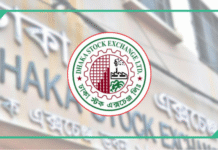
A file photo shows investors trading shares at a brokerage house in Dhaka. Dhaka stocks on Monday slumped for the second day as investors went for panic selling due to concern over the government’s budget proposal to impose 15 per cent tax on the listed companies’ reserves and stock dividends.— New Age photo
Dhaka stocks on Monday slumped for the second day as investors went for panic selling due to concern over the government’s budget proposal to impose 15 per cent tax on the listed companies’ reserves and stock dividends.
DSEX, the key index of Dhaka Stock Exchange, plunged 0.97 per cent, or 53.05 points, to close at 5,377.78 points on Monday after losing 43.47 points in the previous session.
Market operators said that investors’ selling intensified on Monday following the media reports that the National Board of Revenue would bag Tk 11,000 crore in additional taxes from the reserves of the listed companies if the budget proposal was approved.
Finance minister AHM Mustafa Kamal on June 13, in his proposed budget for financial year 2019-20 placed before parliament included a proposal to slap 15 per cent tax on retained earnings and reserve of a listed company if the figures exceed 50 per cent of the paid-up capital of the company.
He also proposed imposition of tax on the value of stock dividend at the rate of 15 per cent, which will be collected from the listed companies within sixty days of such dividend declaration.
The government made the budgetary proposals to encourage listed companies to give cash dividends.
But different trade bodies and market stakeholders opposed the proposals saying such move was against the market norms and would hinder expansion of businesses of companies and discourage listing of new companies.
On Monday, the key DSE index began to dip from the very beginning, in line with the previous day’s trading, and sank sharply to end the session deep into the red zone.
Market operators said that general investors were divided over the government move with some saying that the companies, which accumulated the reserve by deceiving investors, would be forced to pay cash dividends while others arguing that the move would ultimately hurt investors.
‘There is, however, panic among investors as they are fearing that market will fall further if the government does not reverse its proposal to tax companies’ reserves,’ said a stockbroker.
According to the latest DSE data, 209 companies would have to pay Tk 10,792 crore on their Tk 97,901.27 crore reserves only in 2019 as per the proposed budget.
The companies would require paying taxes on their reserves year after year until their reserve came to half of their paid up capital.
Market operators said to stabilise a prolonged bear run, finance minister AHM Kamal had announced before the budget unveiling that there would be incentives for the capital market in the budget.
DSEX gained for eight consecutive days right before the declaration of national budget amid assurance from the minister.
Investors, however, found no incentives, except a moderate rise in limit to tax-free dividend income in budget which rather came up with punishment measures against the listed companies, said market operators.
A BRAC EPL analysis on Monday showed that apart from government’s collection of Tk 11,000 crore in tax from companies’ reserve, the government will collect a further Tk 580 crore in tax from listed companies against their stock dividends.
The data was prepared based on the amount of Tk 3,855 crore that the listed companies provided to the shareholders as dividend for 2018.
An analyst of the brokerage firm said, ‘Introducing such kind of tax will create additional burden for most of the listed companies; in essence the dividend payment is totally based on capacity and policy of a company.’
‘It will force even a growing company with liquidity crisis for high cash dividend payment and eventually the company will require raising equity via right issue or repeat public offering, which in turn will affect the ROE of the companies.’
EBL Securities in its daily market commentary said, ‘the market [on Monday] started with downturn and continued throughout the session without any halt amid lack of confidence arose by investors’ expectation due to imposition of 15 per cent tax on excess reserve and also on stock dividend of listed company proposed by the national budget for FY 2019-20.’
Out of the 351 shares and mutual funds traded, 233 declined, 83 dropped and 37 remained unchanged.
The market regulator Bangladesh Securities and Exchange Commission chairman M Khairul Hossain on Monday urged the investors to remain calm saying that there was enough possibility to reconsider the issue.
He, at a meeting with the stakeholders, said that he would discuss with the NBR chairman and finance minister about the issue.
Bangladesh Association of Publicly Listed Companies, Institute of Chartered Accountants of Bangladesh and Metropolitan Chamber of Commerce and Industry has expressed concern over the 15 per cent tax on the reserve and stock dividends, and urged the government to revise the policy.
The NBR chairman Mosharraf Hossain Bhuiyan at a seminar on Sunday said that it would review ICAB recommendations including imposition of 15 per cent tax on reserve and retained earnings of listed companies proposed in the budget.
But, Bhuiyan’s comments failed to soothe investors on Monday.
As a result, average share prices of all the large capitalised sectors declined on the day.
Share prices of non-bank financial institutions, bank, energy, and textile sectors dropped by 1.9 per cent, 1.92 per cent, 1.2 per cent and 0.8 per cent respectively.
The turnover at the bourse increased slightly to Tk 534.47 crore on Monday from Tk 534.31 crore in the previous session on increased share sales by the investors.
DS30, the blue-chip index of DSE, lost 0.80 per cent, or 15.29 points, to close at 1,889.80 points.
DSE Shariah index DSES shed 0.88 per cent, or 10.95 points, to close at 1,224.45 points.
United Power Generation Company led the turnover chart with its shares worth Tk 17.57 crore changing hands on Sunday.
Source: New Age.









